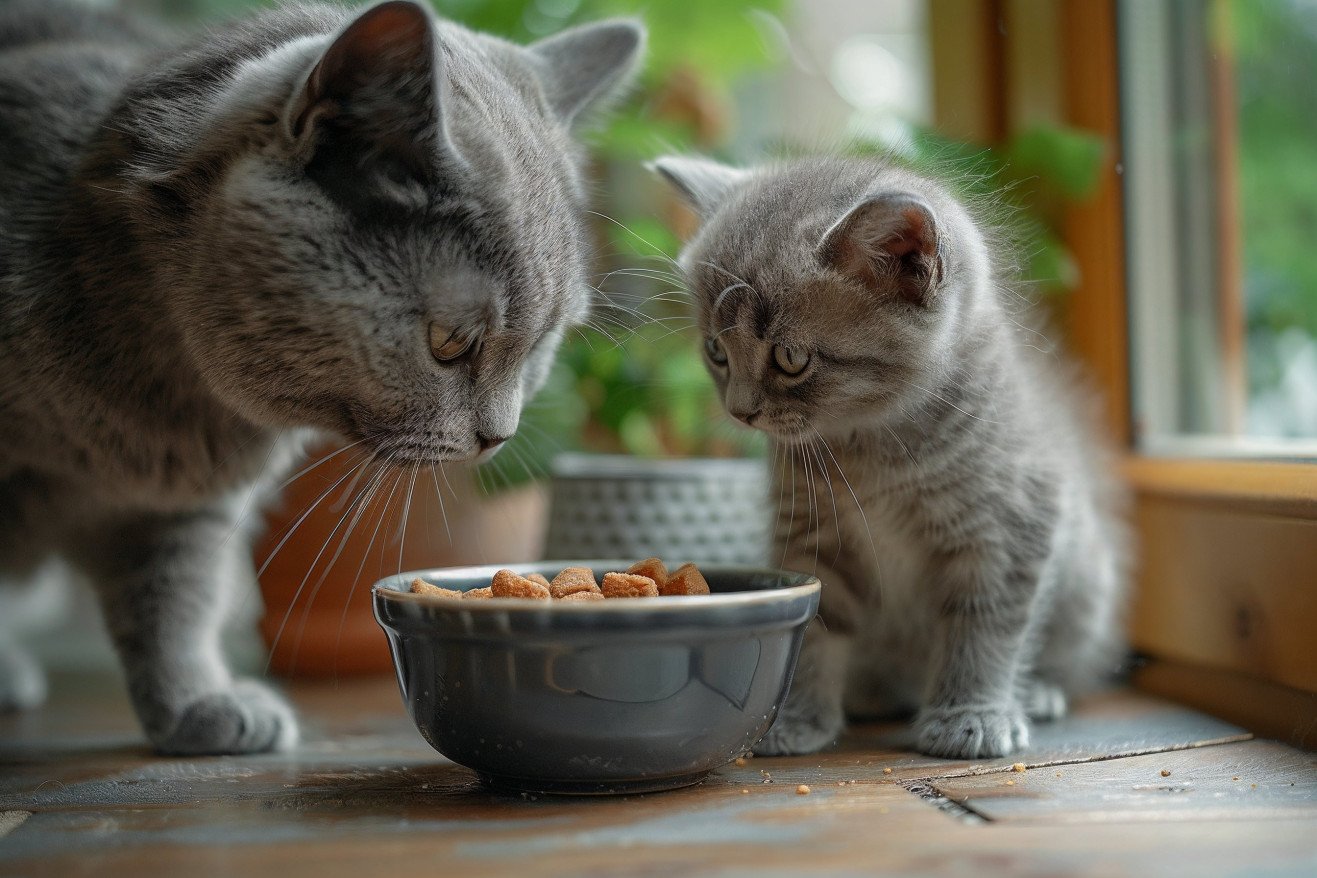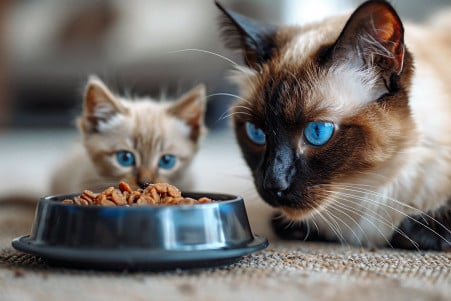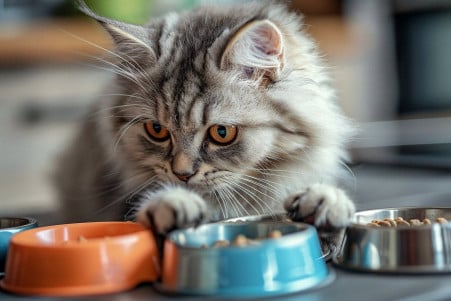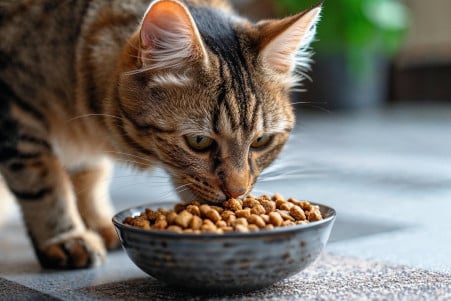Can You Feed Kittens Adult Cat Food? Important Nutritional Facts
15 February 2024 • Updated 14 February 2024

Kittens are in a stage of rapid growth, but their nutritional needs are very different from those of adult cats. Kittens cannot eat adult cat food because it does not contain the nutrients they need to grow. Kittens require a high-protein, high-calorie diet that is specifically formulated to meet their developmental needs. Kittens can be switched to adult cat food at around 10–12 months of age.
This article will review veterinary nutritional studies and recommendations to explain why adult cat food is not nutritionally adequate for kittens. We will look at research on developmental nutrition in cats, consider the dangers of feeding kittens adult cat food, and outline the nutritional needs of kittens during key growth periods. This research will give you a thorough understanding of how to best meet your kitten’s nutritional needs and help them grow up healthy.
Can you feed kittens adult cat food?
Meeting the Special Nutritional Requirements of Growing Kittens
Kittens are not just small cats, and their nutritional needs in the first year are different from those of adult cats and are critical to their development. They need a diet that is high in protein and calories, which is necessary to support their fast growth, including the growth of muscles and organs.
According to Cats.com, kittens need a minimum of 30% protein on a dry matter basis, which is much higher than adult cats, to support their rapid growth in the first few months.
There are also specific nutrients that are especially important at this time. For example, DHA is needed for brain and eye development, which shows that kitten food needs to be different from adult cat food in terms of protein, amino acids, and fat. Kitten food is specially formulated to meet these needs, and it also includes important minerals like calcium and phosphorus, which are important for bone growth, according to Purina.
Kittens go through periods of growth that are especially important, with the most rapid growth happening in the first 24 weeks, according to Vetstreet. During this time, their body weight can increase exponentially. For larger breeds like the Maine Coon, which takes longer to reach maturity, the time when they should be fed kitten food can be extended to 18 months to two years.
This knowledge of kitten nutrition shows how important it is to make sure kittens get the right start for a lifetime of good health.
Potential Health Consequences of Poor Feline Nutrition
Feeding kittens adult cat food can result in a number of health problems due to the fact that the diet is unlikely to meet the high nutritional requirements for growth and development.
The Clinical Nutrition Service at Cummings School notes that early dietary patterns are important for future health, and a study from the Bristol Cats Study found that non-compliance with World Small Animal Veterinary Association recommendations was associated with a higher risk of gastrointestinal disease later in life.
This means that kittens who don’t receive the right nutrition for their growth stage may be more likely to develop chronic digestive issues.
Poor nutrition in kittens can result in a number of health problems, including growth delays, immune deficiencies, and developmental abnormalities. PetCareRx notes that signs of nutritional deficiencies can include poor weight gain, a lackluster coat, and in extreme cases, organ failure or death. It’s important to address these deficiencies as soon as possible to avoid long-term health problems.
Poor diets during kittenhood can also contribute to gastrointestinal diseases, as an unbalanced or low-quality diet can lead to an unhealthy microbiome and immune system. Many of the symptoms of these deficiencies can be avoided with a diet that includes all of the essential nutrients and is formulated specifically for kittens, according to PetCareRx. It’s important to make sure that a diet will help a kitten’s digestive system mature for their overall health.
Feeding the Growing: Kitten Digestive Maturation
Kittens have a highly active digestive maturation process that is critical to their overall growth and development. When they are born, their digestive systems are immature and their digestive enzymes are not fully functional, but this changes as they mature.
One study published in PubMed found that kittens over 19 weeks of age had significantly improved protein, fat, and carbohydrate digestibility, indicating that their digestive systems become more efficient at breaking down a variety of nutrients as they mature.
Diet is also important in shaping the gastrointestinal microbiome, which is important for nutrient digestion and overall health. One review published in PMC noted that the gastrointestinal (GI) microbiome has a significant impact on nutrient digestion and the formation of beneficial postbiotics. As a result, a diet that includes microbiome-modulating components, such as prebiotics, can have a positive impact on a kitten’s gastrointestinal development and function.
In addition to these changes, kittens also undergo physiological changes that impact the digestibility of their food as they mature. As a result, it’s important that kitten food is formulated to meet their changing digestive needs to ensure they grow and thrive. Knowing what these needs are is important for feeding a healthy feline friend and ensuring a successful switch to an adult cat food that will continue to support their health.
Taurine Is Essential for Kittens’ Development and Health
In addition to being a supplement, taurine is an essential amino acid for cats that is necessary for kittens’ survival and development. Research published in PubMed has shown that taurine deficiency can lead to stunted growth in kittens, including smaller brain sizes and lower survival rates. Taurine is so important that a lack of it can even impact cats’ reproductive health.
Research in Neurochemical Research has shown that kittens with taurine deficiency have much lower levels of taurine in their brain tissue than kittens with normal levels of the amino acid.
Meanwhile, the Journal of Nutrition has shown that this can lead to serious issues, including retinal degeneration. A diet high in taurine is necessary for the development of important functions like vision and heart health, which shows how important taurine is for preventing long-term health problems.
Because kittens have higher taurine needs than adult cats, kitten food is formulated to have higher levels of taurine than adult cat food. As a result, it’s important for pet owners to make sure their kittens are getting enough taurine in their diets to fully support their developmental needs.
How to Make the Switch: Kitten to Adult Cat Food Transition
When your kitten is nearing a year old, it’s time to start transitioning them to adult cat food. However, this should be done gradually to avoid any digestive issues. IAMS recommends that the transition from kitten to adult cat food take place over the course of about four days, with the amount of adult food in the diet increasing over time.
Start by mixing a small amount of adult cat food in with the kitten food, then gradually increase the amount of adult food while decreasing the amount of kitten food over the next seven to 10 days, according to Petpedia. During this time, look for signs that your kitten is ready for the change, including consistent growth, a slower rate of weight gain, and an interest in adult cat food.
It’s important to keep an eye on your kitten’s health. Vetstreet advises that you watch for signs of gastrointestinal upset, including changes in appetite, stool, or energy levels. If you notice any of these symptoms, be sure to contact your vet.
When you’re looking for an adult cat food, make sure to choose a high-quality option that meets the nutritional standards set by the Association of American Feed Control Officials to make sure your cat is getting the balanced diet they need to stay healthy.
By making sure that your cat has a smooth transition to adult cat food, you’ll be setting them up for a lifetime of health and wellness, ensuring that they stay active and spry as they confidently move into adulthood.
Feeding the Future: A Complete Guide to Kitten Nutrition
To sum up, kittens need a special diet that is high in protein, calories, and nutrients like DHA and taurine to help them grow and develop. Feeding kittens adult cat food can result in deficiencies and potential health problems, including developmental issues, vision and heart problems, and digestive disorders. As a kitten’s digestive system matures, it needs a diet that will help it grow and change, with an emphasis on digestive and microbiome health.
When kittens are ready to switch to adult cat food at 10–12 months, it’s important to make the change slowly and carefully monitor their health. It’s also important to choose a high-quality adult cat food that will continue to meet their nutritional needs as they age.
All cat owners are encouraged to work with their veterinarians to get personalized nutritional recommendations that take their individual kittens’ needs into account. By making sure their kittens get the right nutrition from the beginning, cat owners can help ensure their cats will be healthy and happy in the long run, setting them up for a life of health and well-being.


